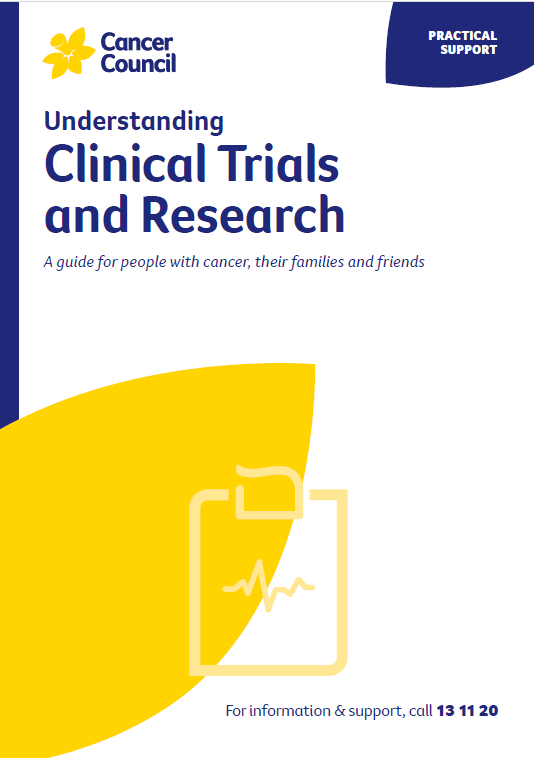- Home
- About Cancer
- Cancer treatment
- Clinical trials and research
- Clinical trials explained
- Other types of clinical research
Other types of clinical research
Clinical trials are not the only type of clinical research studies. You may also be invited to get involved in behavioural research or translational research.
Learn more about:
Behavioural research
Behavioural researchers try to understand why people behave in the way that they do. They study the characteristics, lifestyles and social situations of different people to see how these factors may affect the risk of developing or surviving cancer. They then try to develop ways to prevent or change behaviours that might increase cancer risk or lower survival outcomes. Behavioural researchers also look at the emotional and social impacts of cancer on the person with cancer, as well as the impact on their family and friends.
If you take part in a behavioural research study, you may be asked to fill in surveys or be interviewed about your lifestyle, including your eating, drinking, smoking and exercise habits.
You may also be able to take part in a program aimed at changing these behaviours. For example, you might be offered free counselling, an exercise class or a session on healthy eating. The aim of the programs may be to reduce cancer risk or to improve how you cope with the impacts of cancer.
Psychosocial research
One area of behavioural research is called psychosocial research. This looks at how cancer affects people emotionally, psychologically and socially. In cancer care, this is sometimes called psycho-oncology.
Researchers try to understand how patients and carers cope emotionally at different stages of a disease. They develop and test ways to improve people’s ability to deal with the impacts of cancer.
Translational research
Translational research forms a link between laboratory and clinical research, or between clinical research and standard treatments. It aims to get new treatments or medical approaches into practice quickly. It is sometimes called “bench to bedside” research because laboratory research results are directly used to create new therapies and tests. The findings of behavioural and psychosocial research are also translated into information resources for people affected by cancer.
There can also be “bedside to bench” research – for example, hospitals, treatment centres and health professionals may collect information about how well a treatment works to help laboratory researchers work out what to study next.
Video: What are clinical trials?
Medical Oncologist Dr Elizabeth Hovey explains what clinical trials are and how they can improve cancer treatment.
Podcast: Making Treatment Decisions
Listen now
More resources
A/Prof Brett Hughes, Senior Staff Specialist, Medical Oncology, Royal Brisbane and Women’s Hospital and The Prince Charles Hospital, and Associate Professor, The University of Queensland, QLD; Christie Allan, Clinical Trials Lead, Cancer Council Victoria, VIC; Dawn Bedwell, 13 11 20 Consultant, Cancer Council Queensland, QLD; Joanne Benhamu, Senior Research Nurse, Team Lead, Lung, Colorectal and Palliative Care Trials, Parkville Cancer Clinical Trials Unit, Peter MacCallum Cancer Centre, VIC; Louise Dillon, Consumer; Sabina Jelinek, Clinical Nurse Research, St John of God Murdoch Hospital, WA; Chloe Jennett, Program Coodinator, Cancer Research, Cancer Council NSW; Carmel McCarthy, Consumer; Alison Richards, Research Unit Manager, Medical Oncology Clinical Trials Unit, Flinders Medical Centre, SA; Prof Jane Ussher, Translational Health Research Institute (THRI), School of Medicine, Western Sydney University, NSW; Prof Janette Vardy, Medical Oncologist, Concord Cancer Centre, and Professor of Cancer Medicine, The University of Sydney, NSW.
View the Cancer Council NSW editorial policy.
View all publications or call 13 11 20 for free printed copies.
Need to talk?
Support services
Coping with cancer?
Speak to a health professional or to someone who has been there, or find a support group or forum
Looking for transport, accommodation or home help?
Practical advice and support during and after treatment
Cancer information
Cancer treatments
Learn about common cancer treatments, such as surgery, chemotherapy and radiation therapy
Dealing with the diagnosis
Common reactions to a cancer diagnosis and how to find hope


